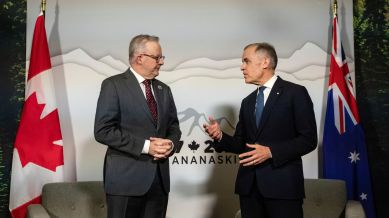Stay updated with the latest - Click here to follow us on Instagram
Israel-Iran conflict dominates G7 talks as leaders gather in Canada
As the summit entered its second day on Monday, The Israeli military reported fresh missile launches from Iran, prompting further air defense operations.

The escalating conflict between Israel and Iran has overtaken the agenda at the G7 Leaders’ Summit in Canada’s Rocky Mountains, where heads of the world’s leading economies have gathered. As the summit begins, the focus shifted sharply to the Middle East, following days of deadly airstrikes, missile barrages, and fiery rhetoric between Israel and Iran.
Global leaders are racing to prevent further escalation as civilian deaths mount on both sides.
The Israeli military reported fresh missile launches from Iran early Monday, prompting further air defense operations.
The latest wave of attacks followed Israel’s surprise offensive on Friday, dubbed Operation Rising Lion, which targeted Iran’s nuclear and military infrastructure. Iranian officials say more than 220 people have been killed so far, with nearly 90% reported to be civilians. At least 10 Israelis, including children, have also died.
“I hope there’s going to be a deal. I think it’s time,” said US President Donald Trump, responding to reporters before a bilateral meeting with Canadian Prime Minister Mark Carney on Monday. “Sometimes they have to fight it out,” he added.
Trump vetoed Israeli plan to target Khamenei
The Associated Press reported that US President Donald Trump recently vetoed an Israeli proposal to assassinate Iran’s Supreme Leader Ayatollah Ali Khamenei — a dramatic indication of how close the allies came to further escalation. Two US officials confirmed the move to both AP and Reuters.
Trump has denied any direct American military involvement in the strikes, though US forces reportedly assisted in intercepting Iranian projectiles aimed at Israel.
Meanwhile, Iran has told mediators Qatar and Oman it will not consider a ceasefire while under attack, according to officials briefed on the communication.
G7 Unity under pressure
Leaders at the G7 — including those from the UK, France, Germany, Italy, Japan, and the European Union — have expressed concern about the possibility of a wider conflict that could destabilise global markets and energy supplies. British Prime Minister Keir Starmer said he had discussed efforts to de-escalate with both Netanyahu and Trump. He warned of “intense discussions” throughout the summit.
Host Prime Minister Mark Carney has opted not to issue a joint communique, breaking with G7 tradition. The summit risks devolving into a series of bilateral conversations rather than a unified stance on global crises.
German Chancellor Friedrich Merz outlined four goals: Preventing Iran from building nuclear weapons, upholding Israel’s right to defend itself, preventing further escalation, and keeping room open for diplomacy.
Trump remains the wild card
Trump’s presence at the summit continues to rattle allies. He arrived late Sunday and has already unsettled conversations by reviving past threats to make Canada the “51st state” and joking about acquiring Greenland — a comment that prompted French President Emmanuel Macron to stop in Greenland en route to Canada, and affirm that Greenland is not for sale.
Canadian officials and other leaders are preparing for unpredictable turns in tone. Former Prime Minister Jean Chrétien said, “He tends to be a bully… If Trump has decided to make a show to be in the news, he will do something crazy. Let him do it and keep talking normally.”
Ukrainian President Volodymyr Zelenskyy is also attending the summit and is scheduled to meet with Trump.
(With inputs from Reuters, AP)